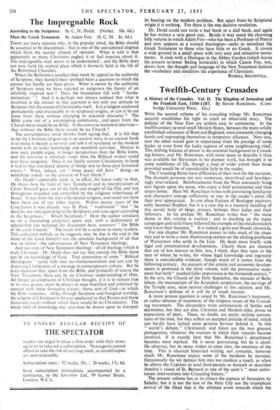The Impregnable Rock
THERE are many reasons why, in the popular mind, the Bible should be assumed to be discredited ; that is one of the unexamined dogmas which form the secular climate of opinion. What is odd is that apparently so many Christians neglect it or feel insecure about it. The impregnable rock seems to be .undermined ; and the Bible does not now hold the central place which it formerly held in the life of the Reformed Churches.
When the Reformers justified their work by appeal to the authority of Scripture, they handed their spiritual heirs a question to which the answer has hardly yet been given. What is meant by the authority of Scripture once we have rejected or outgrown the theory of an infallibly inspired text ? Does the foundation fall with " funda- mentalism " ? And it is perhaps not always realised that what is involved in the answer to that question is not only our attitude to Scripture but the nature of Christianity itself. Is it a religion anchored permanently and irrevocably to its scriptural origins, or can it be cut loose from these without changing its essential character ? The Bible came out of a worshipping community, and apart from the Church there would be no Bible. Is the converse statement also true— that without the Bible there would be no Church ? The contemporary mind shrinks from saying that. It is felt that to tie the Christian religion up to an ancient story in an ancient book is to make it merely a survival and rob it of revelance to the modern world with its wider knowledge and manifold activities. History is now seen, people argue, in longer perspectives than the Bible knew, and the universe is infinitely vaster than the Biblical writers could ever have imagined. Does it not fatally narrow Christianity to keep it tied to that out-dated scheme of things and to those•past historical events ? What, indeed, are " those queer old Jews " doing—as somebody asked—in the universe of Fred Hoyle ?
Dr. Dodd's admirable study is, in effect, his latest reply to that. He shows how the faith of New Testament and its interpretation of Christ Himself grew out of the faith and insight of the Old, and was throughout moulded and controlled by the religious inheritance of Israel. It was from the start a Scriptural religion, and could not have been born out of any other matrix. Within twenty years of the Crucifixion it was already, says St. Paul, " traditional " that " he died for out sins according to the Scriptures and rose again according to the Scriptures." Which Scriptures ? Here the author conducts us on a fascinating analytical quest and, with a deployment of scholarship too technical for discussion here, uncovers " the Bible of the early Church." The result will be a surprise to many readers. This collection (which, as he suggests, may be due in the end to the mind of the Lord himself) was the constant background of all that was to follow—the sub-structure of New Testament theology.
And not only of New Testament theology—of all theology which is truly Christian. Dr. Dodd does not say that outside the Bible there can be no knowledge of God. That contention of some " Biblical theolog;ans " easily falls into neo-fundamentalism and can end by depriving Christianity of a message to contemporary culture. But he does maintain that, apart from the Bible,_a.nd primarily of course the New Testament, there can be no Christian understanding of Him. All future developments of Christian thought, if it is to remain true to its own genius, must be always at once fructified and criticised by contact with those formative events—those acts of God—to which the B;ble witnesses. Alike, through Scripture and liturgical worship, the religion of Chi istians is forever anchored to that Person and those historical events without which there would be no Christianity. The whole field of knowledge may and must be drawn upon to interpret its bearing on the modem problem. But apart from-its Scriptural origin it is nothing. For there is the one decisive revelation.
Dr. Dodd could not write a bad book or a dull book, and again he has written a very good one. Beside it may stand the charming little volume in which Adam Fox—who has been a Professor of Poetry and now appears as a trained theologian—seeks to introduce the Greek Testament to those who have little or no Greek. It covers a wide ground in a pull space with very easy and attractive move- ments. It ends with a Dialogue in the Abbey Garden (which leaves the present reviewer feeling homesick) in which Canon Fox, too, shows how the thought and language of the New Testament fashion the vocabulary and condition the experience of Christians.
RUSSELL SournwELL.


































 Previous page
Previous page